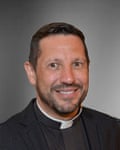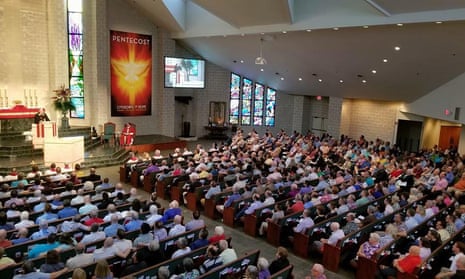Neil Cazares-Thomas began his job as senior pastor at the Cathedral of Hope in Dallas in June 2015, only a couple of weeks before the US supreme court legalised same-sex marriage nationwide. It was an auspicious time to take charge of what has been called the world’s largest gay church. The fight for LGBTQ rights, though, was far from over.
Now Cazares-Thomas – who arrived via Los Angeles and England’s south coast – is among pastors taking a stand against a proposed “bathroom bill” to control the access of transgender people to restrooms and changing facilities in Texas.
Much of the energy behind movements for and against the bill is being driven by Christians, underlining the split between progressive and conservative faith groups and the relationship between religion and politics in an increasingly diverse Bible belt state.
Liberal church leaders rallied against the bill on Tuesday, at an interfaith event outside the capitol building in Austin. Two days later, religious conservatives gathered on the same steps to demand the bill’s passage.
“I think personally that much of this is a backlash against the growing acceptance of lesbian and gay people, and specifically marriage equality and that transgender people are seen as a minority that they can now attack,” Cazares-Thomas said.
“It’s a demonstration of bigotry and discrimination using the name of religion … when we listen to the voices of those who we are making laws against, you understand then that your faith directs you to always be on the side of the marginalised, the poor, the disenfranchised. And when we don’t do that we are not exhibiting the faith of Jesus.”

Founded in the early 1970s, the Cathedral of Hope has 4,000 members. More than 80% of them are LGBTQ, hence its reputation as the world’s largest predominantly LGBTQ congregation. Cazares-Thomas is gay and married with a young daughter. He was raised as a Mormon in Poole, Dorset, and came out aged 15. His family left the church when he was about nine, mainly because his mother, who was divorced from his father, wanted to marry a man who was not a Mormon.
“I knew from my own experiences that the church could be wrong,” the 51-year-old said. “It was wrong about not marrying my mother, the church was wrong about homosexuality in the same way that it’s been wrong about slavery and wrong about women. And I believe that the gospel is about a gospel of inclusion and not exclusion.”
He moved from Bournemouth, where he was senior pastor of the local Metropolitan Community Church, to California when a church in Los Angeles recruited him. Since coming to Texas he has appreciated the diverse faith communities of Dallas and noted the entwining of politics and religion.
“I think what really helps me,” he said, “is to understand the foundations of evangelical Christianity in the United States as a deliberate strategic attempt to ensure that Christians were at every level of government. And to that end they have been extremely successful. But also because of that the church has become a representation of the culture and not a representation of Jesus.
“When I was in the UK I don’t think I was ever asked to open council meetings with prayer even though I was at one point the chaplain to the mayor of Bournemouth. Here the first thing I was asked to do was to pray for council.
“Well, isn’t there separation of church and state here? And if it was true, why would you have a Christian minister or any minister open a state event? There is this blurry line between the separation of church and state and the importance of God and religion in civic life. It’s interesting.”
‘It really is a moral issue’

A bathroom bill failed to pass during the Texas legislature’s regular session earlier this year but the Republican governor, Greg Abbott, called a 30-day special session and placed the matter on the agenda. The Senate has green-lit a bill requiring transgender people in government buildings including schools to use facilities in line with the sex designation as stated on official ID, such as a birth certificate.
The session is halfway through and the proposal is yet to work its way through the House, which is much less enthusiastic. Its ultimate fate may come down to the outcome of a power struggle between its biggest advocate, Dan Patrick, the lieutenant governor and a staunch conservative Christian who has sought to galvanise support from congregations, and Joe Straus, the speaker of the House and a more moderate voice who is firmly against it.
An economic boycott struck North Carolina when it passed a similar law in 2016, only to partially repeal it this year. Texas’s plans have attracted opposition from a host of big businesses and police chiefs, while the Episcopal church could move its 2018 General Convention out of Austin if a bathroom bill becomes law.
In the current national political climate, however, many Texas Republicans are increasingly doctrinaire. About 150 people gathered in roasting heat for Thursday’s rally. It was organised by the Texas Pastor Council (TPC), a division of the Houston-based US Pastor Council, a cultural and political activist group that includes on its website a “Special Pastor Commentary: Homosexual Lifestyle is Genocide”.
An open letter endorsed by more than 770 Texas pastors was distributed. It contended that equality and traditional family values are threatened by corporations and politicians pandering to “the less than one-half of 1% of our population who are confused about their gender and their liberal allies”.
Dave Welch, the TPC executive director, said that its members grew concerned after cities passed local anti-discrimination ordinances featuring gender identity protections.
“It really is a moral issue,” he said. “It’s a public decency issue, it’s a public safety issue, there are a variety of factors to it. It’s not overtly religious at all. Unfortunately it seems like the only significant voice left that has any framework of opposing such an ordinance has come from the church.”

Ruth James stood in the crowd, clutching a toilet seat. On it was written: “Rosa Parks did not give up her seat for a man … neither will I!!!”. James saw the bathroom bill as an opportunity to fight back against the perceived erosion of Christian values in American life.
“We learned something when we rolled over and played dead when they took prayer and the Bible out of schools,” she said. “We are not rolling over any more.”
Bathroom bill supporters describe the law as vital for the protection of women and children. Placards were handed out on Thursday with hashtag slogans calling for “Daughters over Dollars” and “Privacy over Predators”.
A similar fear-mongering playbook from Welch and others prompted the resounding defeat of an anti-discrimination ordinance by Houston voters in 2015, though there is no evidence that such ordinances increase sexual assaults in restrooms – which are of course illegal under existing laws. There is, by contrast, evidence that many transgender people are traumatised and endangered by victimization and harassment.
‘I am the man that they don’t want in the women’s restroom’
Ethan Avanzino leads the transgender council at Cathedral of Hope. The 28-year-old is a transgender man who transitioned two years ago. Changing the gender marker on official documents is a complex process in Texas, requiring a court order.
“This bill would put me in the women’s restroom and I have a beard and a hairy chest and hairy legs, so I am the man that they don’t want in the women’s restroom,” he said.
Avanzino has testified in front of Senate committees and met with legislators.
“They’re often confused by me because I look and sound just like every other dude,” he said. “I still question whether they fully understand what it means to be transgender, and if they do understand then they’re just totally freaked out by the concept of it and don’t want us to exist.
“If we are supposed to be more like Jesus and follow his message of ‘love thy neighbour, care for one another, don’t judge’ – that’s everything that they’re not doing. I often say, ‘Father, forgive them for they know not what they do’.”
